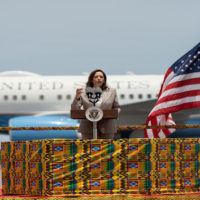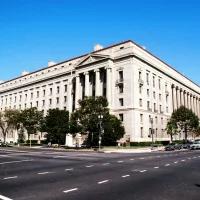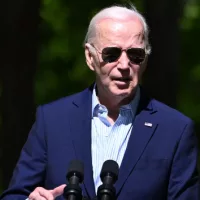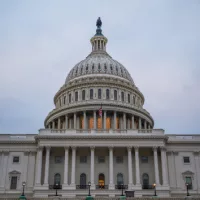
(CAPE COAST, Ghana) — Vice President Kamala Harris started her Tuesday in Ghana looking toward what the future could hold for Africa — but on Tuesday afternoon, she looked back at the dark history of slavery on the continent, visibly moved by what she had just seen at Cape Coast Castle, where Africans were held captive before being sent to the Americas and Caribbean.
“Being here was — was immensely powerful and moving,” Harris said after touring the grounds, her voice breaking with emotion. “When we think about human beings retrieved by the hundreds of thousands, in this very place that we now stand. The crimes that happened here. The blood that was shed here.”
Harris had a speech prepared for the tour, placed on a stand before she walked out, but afterward an official in the vice president’s office said the remarks she actually gave were mostly off the cuff.
“There are dungeons here where human beings were kept. Men, women and children. They were kidnapped from their homes. They were transported hundreds of miles from their homes, not really sure where they were headed. And they came to this place of horror,” Harris said. “Some to die, many to starve and be tortured, women to be raped — before they were then forcibly taken on a journey thousands of miles from their home to be sold by so-called merchants and taken to the Americas, to the Caribbean to be an enslaved people.”
During her tour, Harris and second gentleman Doug Emhoff entered the dungeons, first where the men were kept, and then looked out to the ocean where the ships would leave. Harris stood there for a moment, hands on her hips, at one point wiping her face.
As they walked down toward the dungeon for women and the “Door of No Return,” where slaves were forced onto ships, Harris was seen again overcome with emotion, wiping her face.
She emerged from the female dungeon with flowers, placing them in an adjacent room where others had also left them on the floor against a wall.
“We don’t know the numbers who died on their way to this place, the numbers who were killed during that passage on the Atlantic [Ocean],” she said after the tour.
But, she said, “The horror of what happened here must always be remembered. It cannot be denied. It must be taught. History must be learned. And we must then be guided by what we know also to be the history of those who survived in the Americas, in the Caribbean — those who proudly declare themselves to be the diaspora.”
The docent who accompanied the vice president at Cape Coast Castle said to reporters that she told Harris how the captives in the dungeons would look up, through the holes of the walls and ceilings around them to the sky beyond and pray for redemption.
The docent also talked of how some of the slaves would sing — and said that she sang for Harris, too, a song about the “problems of life” and wishing for death, “because that means freedom.”
In her speech at Cape Coast Castle, Harris said that “all these stories must be told. All these stories must be told in a way that we take from this place. The pain we all feel. The anguish that reeks from this place.”
“The descendants of the people who walked through that door were strong people, proud people, people of deep faith. People who loved their families, their traditions, their culture, and carried that innate being with them,” Harris said. Despite the horrors they endured, their descendants “went on to fight for civil rights, fight for justice, in the United States of America and around the world,” she said. “And all of us, regardless of your background, have benefited from their struggle and their fight.”
Harris, the first Black U.S. vice president, is on a weeklong trip to Africa, her first while in office. She arrived in Ghana on Sunday and will also travel to Tanzania and Zambia.
She said in a brief speech after arriving in Ghana that she wants to promote “increasing investments,” the “economic empowerment” of women, girls and young businesspeople, “digital inclusion” and food security in light of mounting challenges from climate change.
Earlier Tuesday, she spoke before thousands of young Ghanaians in front of the Black Star Monument, a major landmark in the heart of the capital city of Accra. There, she focused on the importance of women and girls being able to “fully participate in economic, political and social life” and praised “African ingenuity and creativity.”
“What happens on this continent impacts the entire world,” she told the assembled activists, entrepreneurs and students. “Seeing all of you here today makes me so optimistic and excited about this future.”
Copyright © 2023, ABC Audio. All rights reserved.















